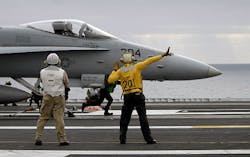Navy asks Lockheed Martin to build 41 more eCASS shipboard avionics test and measurement systems
LAKEHURST, N.J. – Test and measurement experts at Lockheed Martin Corp. will provide 41 more eCASS advanced combat avionics test instruments under terms of a $109 million order announced Friday.
Officials of the Naval Air Warfare Center Aircraft Division in Lakehurst, N.J., are asking engineers at the Lockheed Martin Rotary and Mission Systems segment in Orlando, Fla., to build 41 electronic Consolidated Automated Support Systems (eCASS).
The eCASS equipment is designed to help sailors and Marines to troubleshoot and repair aircraft assemblies at sea or ashore and return the avionics to service quickly.
This contract also provides for eCASS related equipment, kits, and test sets for aircraft intermediate maintenance departments, fleet readiness centers, and shipboard installations aboard aircraft carriers and amphibious assault ships.
The eCASS test equipment is replacing the Navy's legacy CASS test equipment originally fielded in the early 1990s. CASS is the Navy’s standard automatic test equipment family supporting electronics on naval aircraft.
The first eCASS station went to the Navy in February 2014 to support all the aircraft in the Navy’s fleet, extending to new weapons systems such as the F-35 Lightning II joint strike fighter.
Lockheed Martin won a $103 million low-rate initial production (LRIP) contract in January 2014 for the first 36 eCASS test and measurement stations. The company then won a separate $78.5 million order in January 2015 to provide 29 eCASS LRIP units.
The eCASS station is the workhorse for avionics repair across the naval aviation enterprise, Lockheed Martin officials say. The test gear helps aircraft maintenance technicians return equipment to readiness status quickly and efficiently. Compatibility with legacy CASS stations preserves the Navy’s investment in more than 550 test program sets supporting 750 avionics components.
The eCASS architecture is based on the Lockheed Martin LM-STAR commercial automated testing system that is designed to facilitate technology insertion and long-term supportability.
LM-STAR serves as the cornerstone of the F-35 Lightning II harmonization plan, which helps enable several different avionics manufacturers to develop tests to help electronics move from the factory floor to fleet maintenance depots, Lockheed Martin officials say.
On this contract Lockheed Martin will do the work in Orlando, Fla.; Hunt Valley, Md.; North Reading, Mass.; San Diego and Irvine, Calif.; San Diego; Austin, Texas; Everett, Wash.; Bohemia, N.Y.; Minneapolis; and other locations in the Continental U.S., and should be finished by December 2021.
For more information contact Lockheed Martin Rotary and Mission Systems online at www.lockheedmartin.com/us/rms.html, or the Naval Air Warfare Center Aircraft Division-Lakehurst at www.navair.navy.mil.
Ready to make a purchase? Search the Military & Aerospace Electronics Buyer's Guide for companies, new products, press releases, and videos

